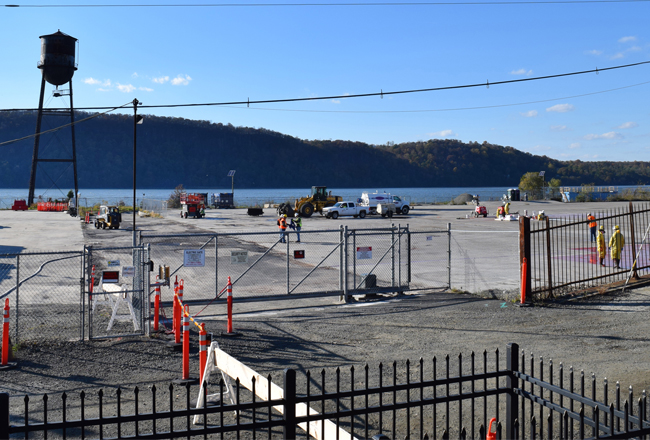Hastings-on-Hudson residents have voted to preserve the iconic water tower that sits along the village”™s contaminated riverfront.
Around 2,000 surveys regarding the fate of the structure were returned to the village last month. Of those surveys, 1,268 respondents voted to remove, restore and reconstruct or replace the tower, while 817 voted to demolish it.

The water tower is on polluted industrial property owned by Atlantic Richfield Co., a subsidiary of BP PLC.
The company”™s multimillion-dollar cleanup of the property continues to move forward. Its design plans for the cleanup of the 28-acre waterfront property  will be submitted to and reviewed by the state Department of Environmental Conservation.
The water tower is on a “substantial pocket of pollution,” according to Hastings Mayor Peter Swiderski, and had always been slated for removal. Atlantic Richfield has pledged up to $1.35 million in matching funds to help either restore or create a new water tower on the property. A preliminary report from an engineering firm hired by the village found that the structure is in “surprisingly good shape given its roughly 90 years.”
Swiderski said the village plans to ratify the survey results and “certify that is the way we are moving forward.” Swiderski said the village will then direct Village Manager Francis A. Frobel to begin the work of issuing a request for proposals to disassemble and store the water tower, a process he expects would occur in 2018.
“Then we need to figure out how exactly we will solicit village input and what the process will look like to choose between restore and replace,” he said. “There is nothing whatsoever determined in that regard.”
The site”™s other iconic structure, Building 52, a red-brick industrial building on the Hastings waterfront dubbed the “literal birthplace” of toxic polychlorinated biphenyls, was demolished earlier this fall.
The remediation of the property is the result of a consent decree that settled a lawsuit which had been filed against Atlantic Richfield by the environmental group Riverkeeper and subsequently joined by the village. It forced Atlantic Richfield to clean up the site.
Earlier this year, Atlantic Richfield said the company was weighing the possibility of bringing in an outside developer to complete the cleanup and move forward with the site”™s redevelopment.
The oil company is consulting with a “short list of developers,” though the company added that the “feasibility and timing of this approach is under review.”
The village also plans to rezone the waterfront parcel from marine industrial use to an as yet to be determined zone in the coming year. That process will likely begin this winter, according to Swiderski, and proceed for 18 to 24 months.
The mayor said the village plans to ask John Nolon, attorney, law professor and founder of the Pace University Land Use Law Center, to assist in that process.






















